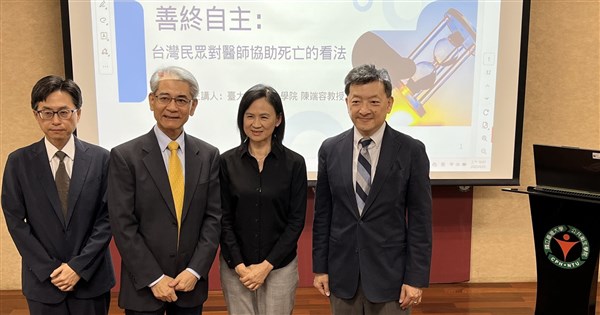Taipei, April 24 (CNA) A majority of people in Taiwan support physician-assisted dying in cases involving terminal illness, long-term physical pain, and severe cognitive impairment, according to a study by National Taiwan University’s College of Public Health.
“While many diseases remain incurable, advances in medical technology have made it possible to delay their progression, resulting in prolonged life,” said Chen Duan-rung (陳端容), a professor at the college’s Institute of Health Behaviors and Community Sciences, at a news conference in Taipei Thursday.
“However, such life extension often leaves patients in long-term pain, disability, or even a state lacking dignity,” she said, adding that more and more Western countries are beginning to recognize an individual’s right to decide when and how to end their own life.
Those methods include euthanasia, a process that requires medical personnel to carry out the final act — such as administering a lethal injection — and physician-assisted dying, in which the patient takes the final action themselves, Chen explained, noting that both are currently illegal in Taiwan.
To understand whether the public in Taiwan supports the right to physician-assisted dying and what factors may influence their views, Chen and her team conducted an online survey of 3,992 Taiwanese adults in 2022, the results of which were published in the medical journal BMJ Open in January.
Participants were asked whether they supported allowing patients to request physician-assisted dying under three scenarios: 86.2 percent supported it for patients with terminal illness and unrelievable long-term physical pain, 79.6 percent for patients with non-terminal but incurable illness causing prolonged pain, and 72.6 percent for patients with severe cognitive impairment and incurable diseases.
Among all respondents, 67.6 percent supported granting patients the right to request physician-assisted dying in all three scenarios, the study showed.
Based on the survey results, Chen said that support for physician-assisted dying was higher among young adults (aged 20 – 39), males, those without religious beliefs, and individuals who work as caregivers.
“Caregivers are on the front lines caring for patients or the elderly,” Chen said, adding that the higher level of support for physician-assisted dying among caregivers may stem from their “empathy and understanding of patients’ suffering” through long-term interactions with them.
Chen, however, noted that healthcare professionals, including doctors and nurses, tended not to support physician-assisted dying in any of the three scenarios, likely due to ethical concerns and legal considerations tied to their professional responsibilities.
The study also assessed participants’ awareness of the Patient Right to Autonomy Act (PRAA) — which allows patients with conditions such as terminal illness the right to refuse futile life-prolonging treatments and opt for a “natural death” — as well as their preparedness for Advance Care Planning (ACP), a proactive approach to making end-of-life care decisions in advance.
Only 37.3 percent of respondents were aware that the PRAA had been implemented, and those who were aware tended to be less supportive of physician-assisted dying, Chen said, noting that in contrast, most physician-assisted dying supporters were unaware that the law was already in place.
“The PRAA grants terminally ill patients, as well as those in a deep coma or with advanced dementia, the right to a natural death, but does not permit them to choose an accelerated one,” Chen said, adding that greater awareness of the PRAA may reduce public support for physician-assisted dying.
For individuals with a higher level of ACP, Chen said that they are “more open to discussions about death and end-of-life decisions,” and thus more accepting of physician-assisted dying.
In terms of the study’s impact, Chen said that the research team hopes it can serve as a “foundation” for future public and ethical discussions on physician-assisted dying.
“It [the study] reflects that many people in Taiwan fear a life worse than death, are willing to accept ‘end-of-life autonomy,’ and are becoming more open to the idea of ‘dying with dignity,'” she said.
